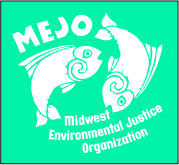
By Jim Powell
Midwest Environmental Justice Organization
The Northside-based Midwest Environmental Justice Organization (MEJO) has received a grant from the Center for Health, Environment & Justice (CHEJ), the national grassroots organization founded in 1981 by Lois Gibbs after her historic and successful efforts to fight toxic pollution at Love Canal in Niagara Falls, New York.
“The Center for Health, Environment, and Justice is honored to be able to provide this grant to the Midwest Environmental Justice Organization,” Gibbs said after the funding was awarded. “The program was very competitive, and their proposal reached the top because of the incredible work the group is doing. Grassroots groups across the country are underfunded given the level of impact they have on their communities and larger social change policies. CHEJ is privileged to be able to provide resources to all of these powerful groups, thanks to a small number of generous donors.”
MEJO works to educate community members about the effects of toxic pollution and to engage them in doing something about it. “Unfortunately, even in a relatively privileged and progressive city such as Madison, many people from a variety of backgrounds are exposed to toxic pollution — and lower income people and minorities are more likely to be exposed than more privileged people,” MEJO President Maria Powell explained.
“The CHEJ project,” Powell said, “will focus on outreach to people affected by industrial pollution to learn more about their perspectives about it and engage them in decisions on what to do about it — especially how to prevent toxic chemical exposures among the most vulnerable people. This is the core of environmental justice work.”
Since its founding in 2006, MEJO has worked to address environmental justice issues such as the race and class-based disparities in the consumption of contaminated fish (working with residents of Kennedy Heights and Vera Court neighborhoods), over-use of toxic pesticides on public lands, major highway development in low-income neighborhoods and air and water pollution from urban brownfields and industries. Visit mejo.us for more information.